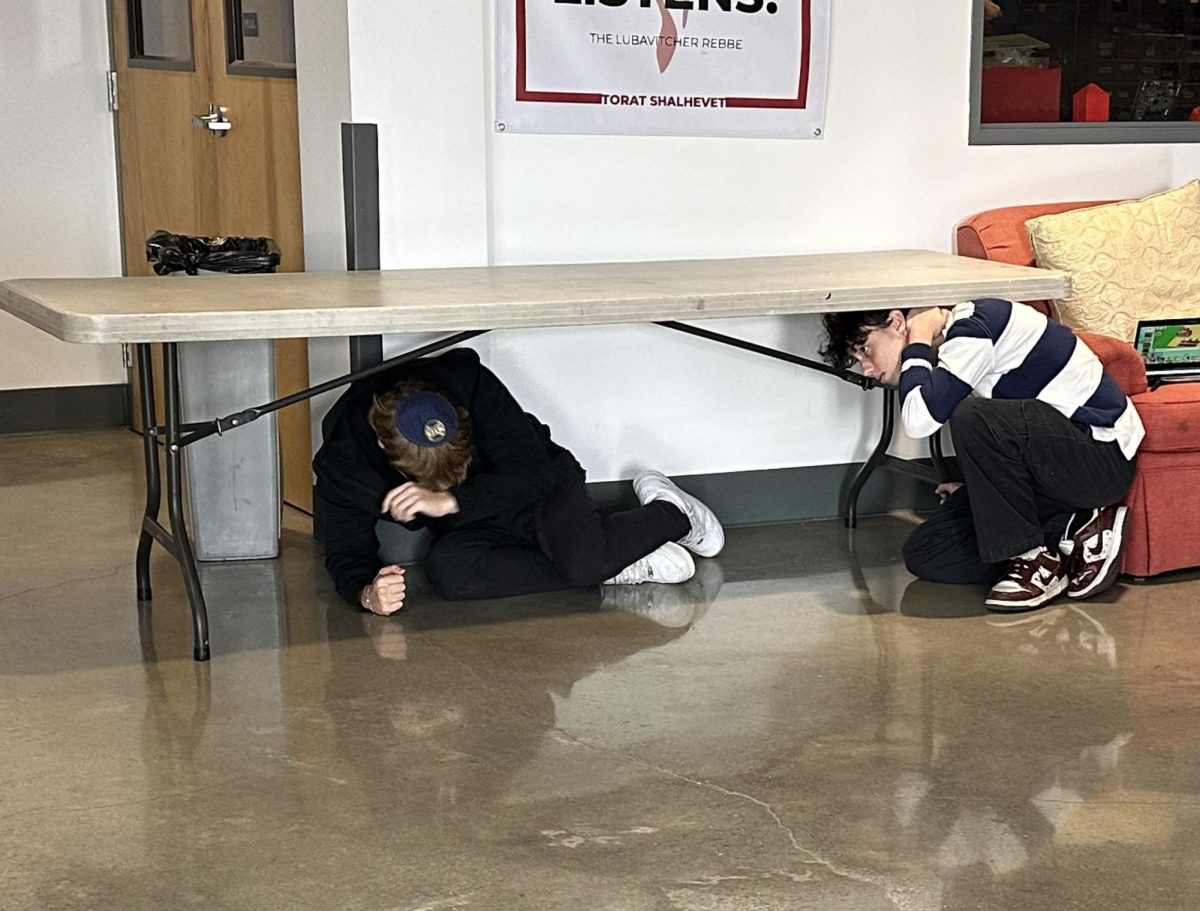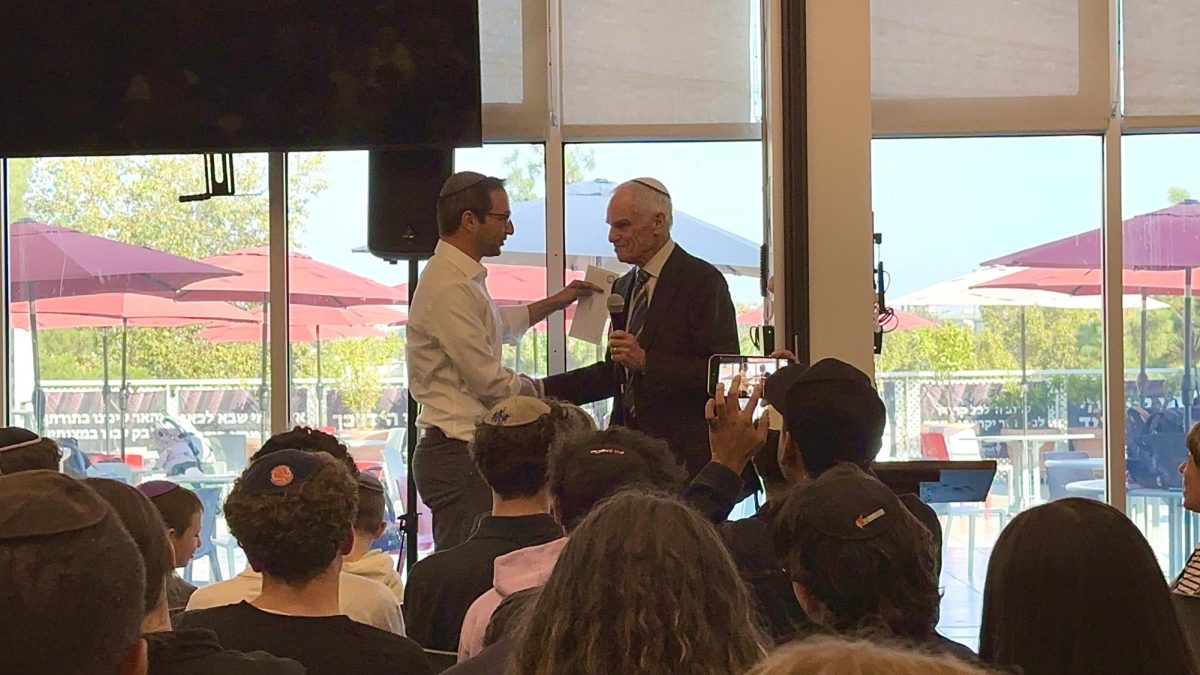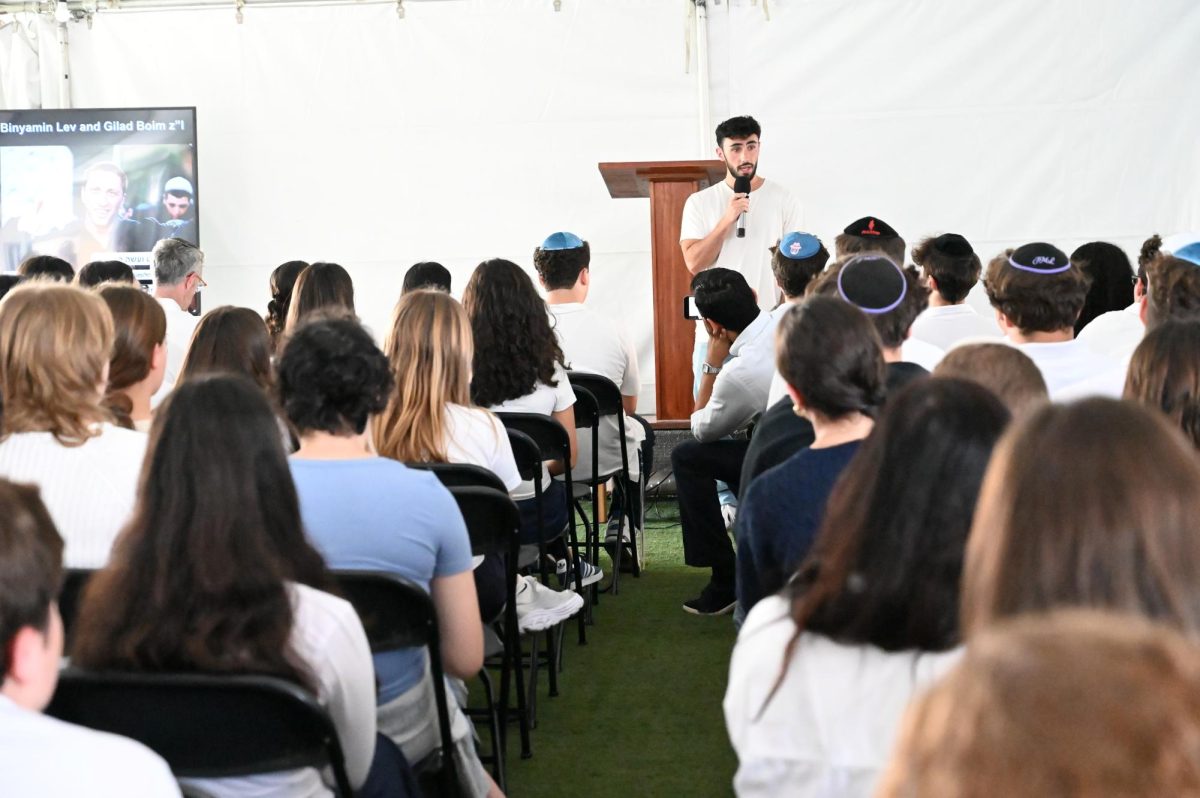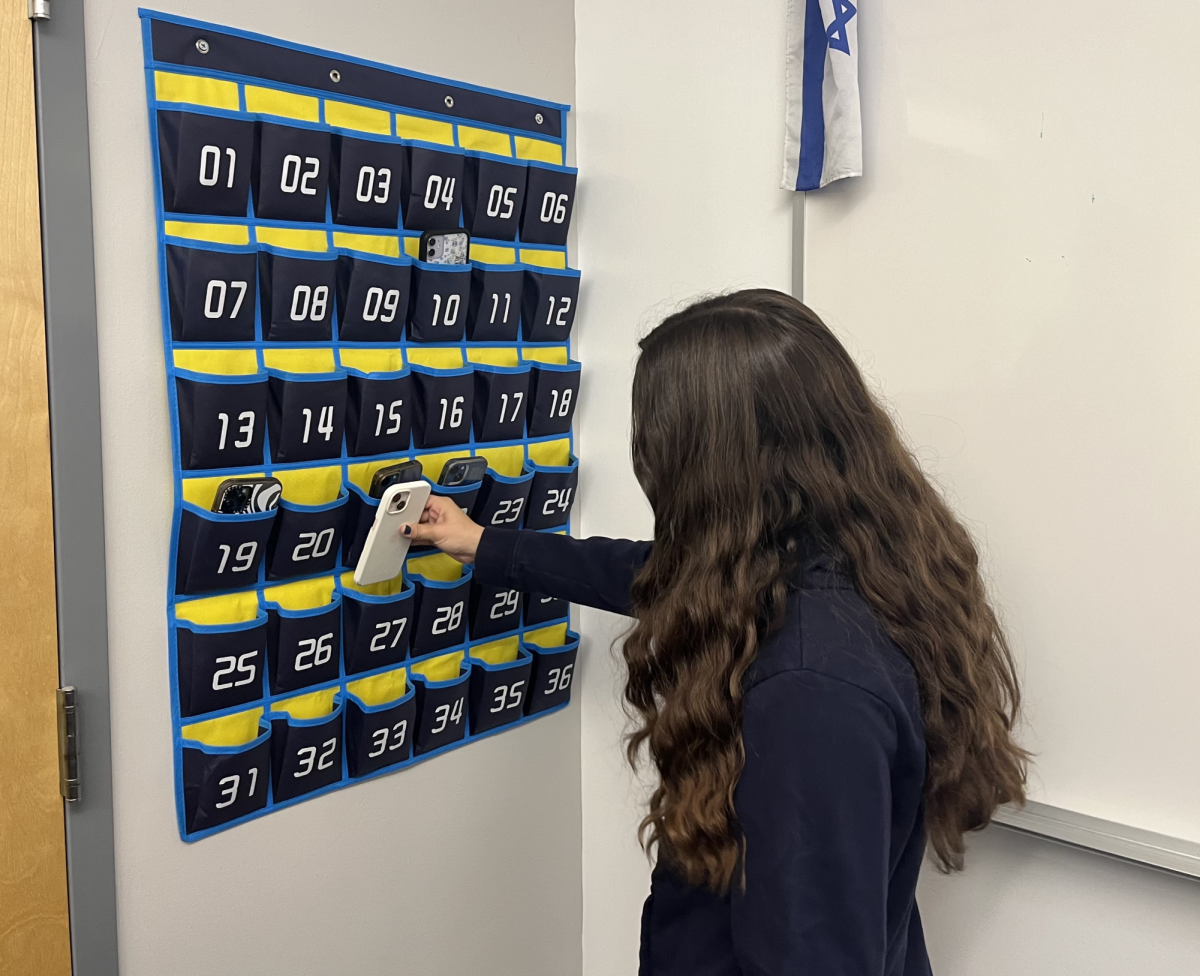In a new twist to Color War breakout, the Student Activities Committee spread a fake story among the student body saying that random drug testing was about to begin at school.
The Boiling Point picked up on the story, getting confirmation from administrators and publishing a story April 25 that turned out to be false. A tense day ended in laughter when Color War broke out at the end of Mincha, and people realized the drug testing story had been a ruse to make it more unexpected.
The next day, Rabbi Ari Segal sent an e-mail to the school mailing list in case anyone was confused.
“To be clear, we are NOT implementing such a policy, nor would I ever implement such a culture-changing policy without first discussing it with the school community — parents, students and teachers,” the head of school wrote.
Meanwhile, the chain of events led to a dispute between The Boiling Point and school administrators, who felt the news coverage had been unfair, while the news staff felt censored when told to remove paragraphs or a complete story from its website for the first time.
SAC member Leora Nimmer first leaked the false story to BP Commmunity Editor Jacob Ellenhorn on Monday, April 23. SAC Faculty Advisor Raizie Weissman said SAC was telling as many people as possible, to divert talk from the likelihood that Color War would be on Yom Haatzmaut coming up later in the week.
But instead of spreading the rumor, Jacob began investigating, and Judaic Studies Principal Rabbi Ari Leubitz and school counselor Rachel Hecht both confirmed Leora’s story.
“There will be drug testing taking place,” said Mrs. Hecht in an interview. Answering questions, she also gave some details about how students who tested positive would be treated.
Rabbi Leubitz said the supposed change in policy had been “mandated from outside the school” but declined to say who was mandating it.
“I suspect there will be a test some time in the future,” Rabbi Leubitz said.
Both Rabbi Leubitz and Mrs. Hecht knew about the ruse.
On Wednesday morning, April 25, the false story was published on this website under the headline, “Shalhevet to begin random drug testing.” It quoted Mrs. Hecht as saying testing would include both students and staff.
Links were posted and shared on Facebook, and according to Google Analytics, 212 people viewed the website that day, the highest one-day total the website has had.
Then Wednesday afternoon, at the end of a special all-school Mincha honoring Yom HaZikaron, Rabbi Leubitz announced the supposed drug testing to the student body and began to play a video about urine collection.
Suddenly the video was interrupted by SAC co-chairs Yonah Nimmer and Raquel Garshofsky shouting into the camera, ”Color War breakout!”
Mrs. Hecht, who’d been informed about the plan by SAC, said many students came to her office and she didn’t deny the rumor because she didn’t want to ruin Color War.
“It was an incredibly uncomfortable day,” Mrs. Hecht said. “I had mixed feelings about it [the rumor]. It led to some incredibly productive conversations with students. No way do I or the school take drug testing lightly.”
“The intention was to do something bold and they did it,” she said. “Because drug abuse is taken very seriously that’s why SAC knew it would have the shock value they were looking for. Both myself and the school take drug testing very seriously.”
She said that after she was approached by Jacob about the rumor, she realized that a story would be written and asked Rabbi Leubitz to prevent it from being published.
There was some confusion as to whether The Boiling Point was given the green light to publish the story or not. Everyone agrees that on the afternoon before Color War breakout, Rabbi Leubitz asked Boiling Point staff to hold the story until after Wednesday’s Shacharit, saying that he’d been getting “push-back” and needed “to get all [his] ducks in a row.” He did not tell them the story was false.
The editors agreed, even though all interviews had been “on the record” – that is, the people interviewed knew that they would be quoted and did not ask to be anonymous. They also debated the question of whether it was right to withhold information that could affect their readers, because if the testing had been done the next morning, students would have wanted a heads-up the night before.
Rabbi Leubitz said later that he was expected the paper to delay the story until he specifically said it was alright to publish. After Shacharit Wednesday, Editor-in-Chief Leila Miller, Web Editor Jordan Banafsheha, and Jacob went to Rabbi Leubitz’s office and asked if he had anything to add to the story. He said he didn’t.
Sitting in Rabbi Leubitz’s office with Leila and Jordan, Jacob pressed the “publish” button on the website’s control page. Rabbi Leubitz says he did not realize that was happening.
“When they asked me if I had more to add, I did tell them I had nothing to add at that time,” Rabbi Leubitz wrote in an e-mail to The Boiling Point May 10. ”However, I did not imagine that was permission for them to push the button right there and then without verifying they were publishing.”
Rabbi Segal was out of town at the time and not involved, but in his weekly e-mail to the Shalhevet community he praised the Boiling Point’s coverage.
“The Boiling Point ran a story that quoted administrators who promised drug testing,” Rabbi Segal wrote from Argentina, where he was completing his MBA studies. “The reportage was absolutely right—all quotes were scrupulously honest. The next day, the BP ran a story that it was all just a ruse. That was right, too.”
But after he returned, on May 1 he told editors to either remove certain sections or take the story off the website until a new version could be drafted. The Boiling Point removed the story from the website that day, adding the current version May 16.
“I thought the article was written in haste and with far too much emotion for it to be objective,” Rabbi Segal wrote May 16 in answer to questions. “I asked … to have it temporarily removed while emotions were running high and suggested a far more objective story to be written at that point. Just good journalism in my mind– particularly for a Jewish school with Jewish values.”
Editor-in-chief Leila Miller said she wished Rabbi Segal had suggested the changes, instead of mandating them.
“We would have taken the suggestion well,” Leila said. ”I think there were problems with that story. We did what we could with what we had and I was concerned about it at the time. It definitely needed to be changed, but if he had suggested it, that would have been fine too, and we would have changed it.”
Along the way, there were hurt feelings and some embarrassment among the paper’s staff. Jacob Ellenhorn said the incident would hurt the Boiling Point’s credibility.
“We work so hard and they destroy our reputability,” Jacob said the day it happened. “They took something they should be very proud of and they made a fool out of us.” He said it was tantamount to bullying.
SAC members said they had not expected the story to be published in the Boiling Point.
“We never expected an article to be written,” said Raquel Garshofsky. “We just wanted to spread the drug story rumor to everyone.”
Asked April 26 why he had gone along with the ruse, Rabbi Leubitz said, “We were just trying to get the students to kind of talk about this, and it was supposed to be fun — and to try to make them believe that it was happening to break out Color War.
“The intent was to play a trick on the student body, nothing particular against the Boiling Point,” he said.
kBoiling Point faculty advisor Mrs. Joelle Keene said editors had followed usual procedure by checking with Rabbi Leubitz and Mrs. Hecht.
“We check everything we publish with the administration — that’s how we make sure our readers can trust us and can use the Boiling Point to distinguish facts from rumors,” Mrs. Keene said.
Student reaction was mixed but mostly accepting of the breakout ruse.
Junior Adir Hassid was one of many who had read the Boiling Point story and believed it.
“I was appalled,” Adir said. ”They took our trust and then threw it away.”
Senior Deanna Grunfeld, the White Team captain, was also surprised that the drug testing story was not true. But she thought it was a good way to announce Color War.
“I think that’s the point of Color War breakout — to take it too far,” Deanna said. “When I planned Color War in eighth grade, kids were crying. But that’s what made it so great, and people remembered it.
“Each year, kids always complain how lame the color war break outs are… so they have to take it too far to make sure that we all like it.”







